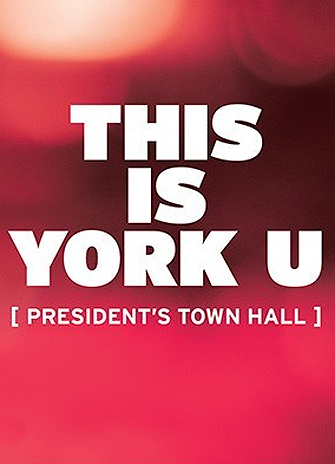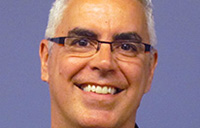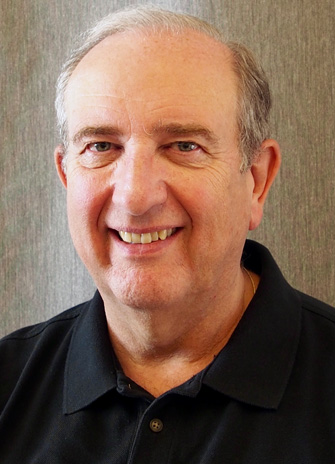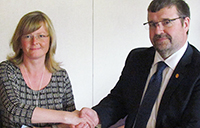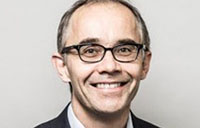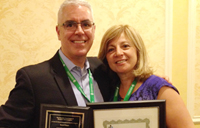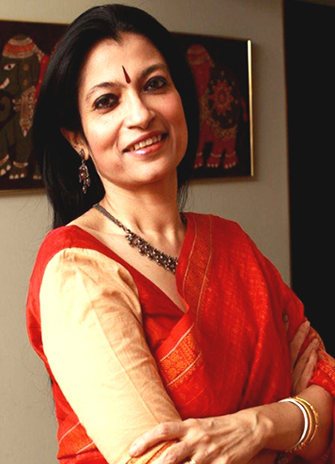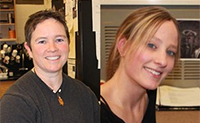Through a proactive approach to planning and resource integration, York University will be well-positioned to navigate a triple threat of changing government policy, flattening enrolment and reduced funding. That was the central message of Wednesday’s President’s Town Hall Meeting.
Presented in the Sandra Faire & Ivan Fecan Theatre in the Accolade East Building on the Keele campus, the town hall is an annual pan-University event. This year, the University hosted a community café prior to the event.
An audience of more than 200 faculty, staff and students gathered in the theatre. They were joined by thousands more who viewed the proceedings online; a special televised feed was set up for the Glendon campus community.

Joining York President and Vice-Chancellor Mamdouh Shoukri in the town hall were Vice-Presidents Gary Brewer (Finance & Administration), Robert Haché (Research & Innovation), Rhonda Lenton (Academic & Provost), and Jeff O’Hagan (Advancement). Marie-Helene Budworth, professor of human resource management in the Faculty of Liberal Arts & Professional Studies, served as the event’s moderator.
The State of the University
In his presentation titled “The State of the University,” the president offered an overview of developments that had taken place since last year’s town hall and the challenges the University is facing.
York University is operating within an increasingly complex and difficult postsecondary environment, said Shoukri. Uncertainty about government policy going forward, the desire by government to see a highly differentiated mission for each university and growing fiscal pressures on all universities are contributing to the challenging environment for Ontario’s postsecondary sector, he said, noting that York University, despite its size, is not immune to any changes that can take place as a result of changes in government policy.
Added to the mix is that enrolment of 18- to 24-year-olds is expected to flatten out for all universities over the next few years, which in turn will bring additional fiscal challenges. And while the leveling out of enrolment will be temporary, it does bring with it a more competitive environment between universities as each vies for more students, he said.
“A key challenge you are fully aware of is the fact that there is an imbalance between revenue and expenses,” said Shoukri. “On average over the last number of years, our revenue has increased between one and two per cent, mostly through increases to tuition fees.
“Our expenses have increased by four to five per cent, which is fundamentally due to increased salaries and increased costs of operating the university,” he said, noting energy costs as an example. “At York University, we have managed to deal with that [expenses versus revenues] by balancing growth and enhancing efficiency. We have been doing very well but this cannot continue.”

York University’s focus on clear strategic priorities and proactive planning are equipping the University with the focus and tools the institution needs to navigate these looming challenges.
“Comprehensiveness is a priority for York University,” said Shoukri. “We are doing well with our increased efforts in engineering, health, science and business, but not at the expense of our traditional areas in the humanities and social sciences and law. We are moving in the right direction and we continue to streamline our programs under the direction of the provost and faculty deans.”
Student success is at the heart of all of York University’s priorities, said Shoukri. “Teaching and learning innovation has been central to what we have been trying to achieve. We’ve made significant strides in the last year in technology-enhanced learning and experiential education, which adds up to the quality of the academic programs and the way we deliver those programs,” he said. “We also continue to be committed to increasing and protecting our faculty complement.”
With respect to the University’s focus on community, York University is making huge inroads, said Shoukri. “We define community broadly, from the local through to the international community,” he said.
“Social innovation is a reflection of our commitment to community; by social innovation I mean the capacity of the University to use research in communities and the social sciences to support communities,” said Shoukri, noting that York University is leading a consortium of 11 universities focused on social innovation.
“We believe that York students should be trained to become citizens of the world,” he said. York University’s presence on the global stage is illustrated by the increased number of international students choosing York University as a place to study and conduct research. As well, the University has more than 1,000 students who are studying abroad.
“Our reputation is also on the rise and we continue to enhance the reputation of York University as a global university,” he said. “I see all of the evidence of that and I am very proud of our new campaign that you see here [on the stage].”
The future looks bright for York University because of its focus on sustainability, integration of resources, planning and collaboration, said Shoukri, noting this will propel York through the turbulent times ahead.

Focus on Academic Excellence
Following immediately on the heels of the president’s presentation, Vice-President Academic and Provost Rhonda Lenton spoke about her role in coordinating, facilitating and supporting academic excellence at the University.
Her office, she said, has a particular role in leading and supporting the development of planning that underpins academic excellence. She traced the development of a comprehensive vision for the University, which included a White Paper, an employee engagement survey, the Strategic Mandate Agreement with government and a comprehensive review of all administrative and academic activities underway at the University.
“That context is important to this crucial time now when we are about to embark on the development of the next University Academic Plan, 2015-2020,” said Lenton. “As we undertake those efforts, we always need to be mindful of the external landscape.”
Key questions that drive this awareness include system-wide considerations, innovation that is happening across the Canadian university sector, and an approach to thinking differently about how the University generates alternate sources of revenue. “How can we exploit technology? How can we improve accountability?” said Lenton. “How can we talk about ourselves and communicate what we are doing? The questions we really have to ask ourselves in this competitive, challenging landscape are What sets York University apart? Why should people choose York?
“We are a university without borders,” she said in answer, noting York University’s key commitments to interdisciplinary education, internationalization and its focus on community. Student surveys highlighted that York University is seen “as an approachable university committed to accessibility and an innovator committed to new ways of thinking.”
York University’s strengths in the liberal arts combined with strength in professional studies are well known in the world, she said. The question, said Lenton, focuses on what are the next steps that must be taken to ensure that the University continues to build on those strengths and the qualities that differentiate York from other universities.
For the University to realize its well-articulated vision, Lenton said the community must focus on its values and how to collectively drive change. “We have the commitment to sustainability. We have the tools – strategic enrolment management, our integrated resource planning framework, the new budget model and most importantly, the people,” she said. “My invitation to you today and over the next year is this; we will only be successful with bottom-up ownership of change – all of us working together. We are on the right path.”
Research Excellence and Intensification
Following Lenton’s presentation, Vice-President Research & Innovation Robert Haché delivered his update on the University’s focus on research intensification.
“In 2014, York University faculty, staff and students published more than 1,700 journal papers, books, conference proceedings as well as many other exhibitions, supported installations, new forms of output through social media and web-based applications, and that number continues to grow,” said Haché.
York University has experienced many triumphs with respect to its research accomplishments and people, from the prestigious Royal Society inductees and awards to increased funding from three granting councils and cross university collaborations among researchers in the university and with other institutions. To foster student, faculty and staff entrepreneurial innovation, the University created the Launch YU incubator to support and encourage entrepreneurship across all sectors, not just for profit, said Haché.
New funding opportunities on the horizon include the Canada First Excellence Fund (a $950-million opportunity) and the Canada Foundation for Innovation large-scale competition for new infrastructure (a $450-million opportunity).
Despite all of these successes, York University has, relative to its size, said Haché, “a relatively modest amount of research output.” To address this, Haché through a pan-University initiative and consultation process, created a Strategic Research Plan. He is now developing a plan, once again with consultation from the community, for the intensification and enhancement of research (PIER).
“This is the next opportunity to engage through collegial discussion about not how we can do more, but how we can achieve more perspective to the research we are doing,” he said. “We hope through the course of this year to have a good, interactive conversation and come back with something that the collegium will be pleased to support.”
A Focus on Financial Sustainability
Next up was Vice-President Finance & Administration Gary Brewer. He provided an overview of the budgetary challenges the University is facing.
With significant budget cuts on the horizon for this year and next, Brewer said the challenges were many. “Over the last 20 years, we’ve seen budget cuts in every year but one. That reality remains with us and it is part of that challenge. In addition, there are significant deficits emerging. In 2014, cumulatively, we ended with a small deficit. That deficit will continue to grow if measures are not taken.”
In 2017-2018, Brewer highlighted that there will be a cumulative deficit of close to $70 million, or about eight per cent of the operating budget. Brewer said that when presenting the budget to the Board of Governors of the University, it was given great scrutiny before receiving approval. That approval, Brewer stated, came with condition that the University deal with the structural deficits over a three-year period and achieve long-term sustainability.
The three-year window was provided, said Brewer, because the board understood that measures such as the implementation of the SHARP Budget Model and the Institutional Integrated Resource Plan (IIRP) would take time to move forward and were important tools in achieving sustainability. The SHARP Budget model, which stands for Shared Accountability & Resource Planning, is a tool integral to supporting the academic mission of the University. “It is a model that is transparent and will ensure the alignment of scarce resources with academic priorities,” said Brewer. “It will give greater control for the faculties with revenues and costs and has a predictable framework for planning and accountability.”
His priority is to focus on achieving financial sustainability by moving forward with the IIRP process, not just on the administrative side, but also on the academic side. From the administrative perspective, Brewer said the IIRP will ensure that all administrative services efficiently and effectively support the University’s academic mission and protect academic quality. IIRP, said Brewer, will have an important role in dealing with enrolment challenges.
“Finally, the implementation of the SHARP budget model, with a careful transition plan, will give us an important tool to align resources with priorities,” he said.
Advancing the University’s Priorities and the Alumni Connection
The final presentation focused on the role of alumni and Advancement and was delivered by the Vice-President of Advancement Jeff O’Hagan.
By way of introduction, O’Hagan highlighted that with close to 300,000 York alumni worldwide, the University was making its mark on the world. “York University is blessed with an incredible alumni community of global citizens,” said O’Hagan. He explained the focus of his division is on engaging alumni with the University and with each other. To achieve this, the Division of Advancement uses many engagement strategies, from hosting events, to organizing networking and mentorship opportunities.
“We want our alumni to work together to realize there is a great network they can connect to and we want to connect alumni to the student experience and life of the University,” he said. These engagement opportunities have many forms he said, recalling his recent meeting with President for a Day winner Sayjon Aryyarathnam.
“He was a top student and had one of the highest GPA averages, someone the universities were competing for. He got a telephone call from an alumnus of York University and that conversation triggered his decision to come to York University. That alumnus became his mentor and they have been friends ever since,” said O’Hagan, noting how this experience illustrates that alumni are an important resource for the University.
The important role of alumni extends to financial support of the University’s mission, said O’Hagan, noting that over the past few years, York alumni have contributed more than $150 million to the University, money which has been used to create bursaries and student scholarships, to support faculty chairs and other academic initiatives.
The impact of alumni both at the University and globally will drive forward a new fundraising campaign to advance the university and prepare it for the future.
The Road Ahead
The final closing remarks were delivered by Shoukri. He noted that although the challenges faced by the University are many, the road ahead is bright. A new campus in Markham, ongoing academic innovation, program enhancement through IIRP and an enhanced global understanding of York University’s tremendous strengths in research and teaching offers a future full of incredible opportunities, said Shoukri.
“York University is at an inflection point. We have a plan, we have the tools, and we have a new campus. In everything we do we are being mindful of the opportunities before us. Now everything is in the hands of the departments and units. We look forward to hearing from you about the opportunities to do better, to become more efficient and to better serve our students,” he said.

The town hall closed with a question and answer session that covered everything from the future of the University Common with the opening of the subway, to the opportunities offered through the Launch YU incubator, a discussion around divesting from fossil fuel investments and the fiduciary responsibilities of the pension and endowments. Questions also came from students about scholarship and bursary opportunities and there was a suggestion to hold an additional town hall event at the Glendon campus.
The conversation is still ongoing and the president invited community members to continue the dialogue by submitting their questions to the President’s Town Hall website, or through Twitter using the #YUTownHall.


